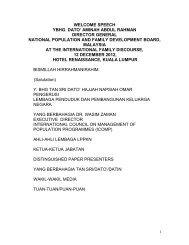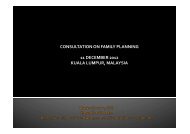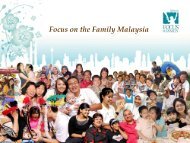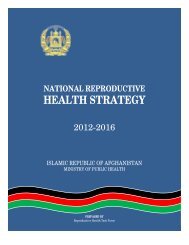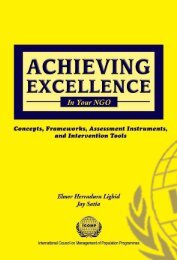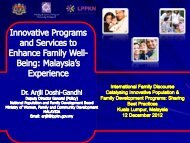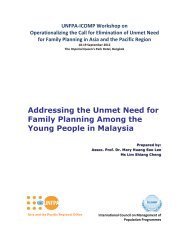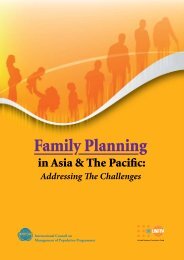SRH and HIV/AIDS Linkages at Policies, Programmes and Service ...
SRH and HIV/AIDS Linkages at Policies, Programmes and Service ...
SRH and HIV/AIDS Linkages at Policies, Programmes and Service ...
Create successful ePaper yourself
Turn your PDF publications into a flip-book with our unique Google optimized e-Paper software.
guidelines especially those rel<strong>at</strong>ed toVCT, PMTCT <strong>and</strong> ART.However it was noted th<strong>at</strong> saidguidelines, especially RH rel<strong>at</strong>edprotocols, are not used in the priv<strong>at</strong>esectors, including medical colleges inNepal. These institutions are guidedby their own hospital guidelines <strong>and</strong>protocols.Pursuant to the Eleventh Amendmentto the Muluki Ain (code of conduct),the legal age for marriage for both sexesis 20 years; however, where the parentsor guardians consent to the marriage,the minimum age is 18 years for bothsexes. Generally, a marriage must beperformed with the consent of bothparties. Marriages entered into withoutthe free <strong>and</strong> full consent of both partiesare voidable.In Nepal, the legal age of consentfor <strong>HIV</strong> testing is 18 years. Anyone18 years or older requesting VCTis deemed able to give full informedconsent. Children (below 14 years) <strong>and</strong>minors (under 16 years) cannot legallyprovide consent.Under the following circumstances,<strong>HIV</strong> testing may be recommended tominors:Children born to <strong>HIV</strong> positivemothers (<strong>HIV</strong> exposed children)Children <strong>and</strong> adolescents withclinical indic<strong>at</strong>ors of <strong>HIV</strong>/<strong>AIDS</strong>Vulnerable children <strong>and</strong> adolescents<strong>at</strong> increased risk of <strong>HIV</strong> infection(e.g. street children)Children <strong>and</strong> adolescents whoengage in high risk behaviour suchas sex work or injecting drug useChildren <strong>and</strong> adolescents who havebeen sexually abusedAdolescents who are sexually activeor are marriedIn these circumstances, the counselloror clinician will need to explore with theminor <strong>and</strong>/or their parent/guardian:Whether it is in the best interest ofthe minor to be tested for <strong>HIV</strong>Whether the minor <strong>and</strong>/or parent/guardian would benefit fromcounselling <strong>and</strong> testingWho will provide consent?Whether, when <strong>and</strong> how the minorwill be informed of the <strong>HIV</strong> testresult (disclosure to children)Consent for <strong>HIV</strong> testing ofadolescents (young peopleunder the age of 18)All young people under the age of18 accessing VCTs should haveaccess to preventive counsellingregardless of their marital st<strong>at</strong>us <strong>and</strong>whether or not parents or guardiansconsent. Counselling should includeinform<strong>at</strong>ion on <strong>SRH</strong> <strong>and</strong> FP. <strong>HIV</strong>testing may be undertaken withoutparental consent on a case-by¬-casebasis, if the counsellor determines th<strong>at</strong>the minor has sufficient m<strong>at</strong>urity tounderst<strong>and</strong> the testing procedures <strong>and</strong>results. Adolescents can be design<strong>at</strong>edas ‘m<strong>at</strong>ure’ or ‘emancip<strong>at</strong>ed’ minors ifthey are married, pregnant, <strong>and</strong> sexuallyactive, or are already parents.75



